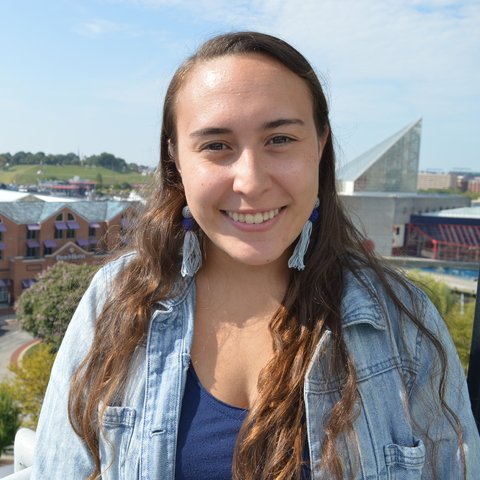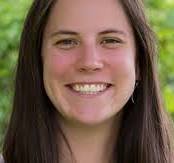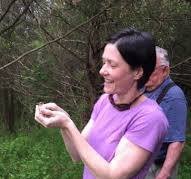2024 MEES PROGRAM & memorial award winners
2024 DEBORAH MORRIN-NORDLUND TRAVEL AWARD | 2024 REID EVANS MENZER MEMORIAL AWARD
Syeda Ali Photo Courtesy: UMCES/CBL
Maya Drzewicki Photo Courtesy: UMCES/CBL
Yanyu Wang Photo Courtesy: UMCES/AL
Qianru Liao Photo Courtesy: UMCP/AGNR
Kyarii Ramarui Photo Courtesy: UMCES/IMET
Haoran Liu Photo Courtesy: UMES
July 24, 2024 - Congratulations to Syeda Ali (advisor: Dr. Lee Cooper), Maya Drzewicki (advisor: Dr. Michael Wilberg), and Yanyu Wang (advisor: Dr. Xin Zhang) who are the newest recipients of the highly competitive Deborah Morrin-Nordlund Travel Award, and Qianru Liao (advisor: Dr. William Fagan), Kyarii Ramrui (advisor: Dr. Yantao Li) and Haoran Liu (advisor: Dr. Meng Xia) who also earned the prestigious Reid Evans Menzer Memorial Award! This is a well earned recognition of all your hard work. The MEES program is very proud of you!
2024 BILL HUPPERT 2024 clint waters ENDOWED STUDENt 2024 MEES GRADUATE STUDENT PROGRAM FUND student award award
Erika Koontz Photo Courtesy: UMCES/HPL
Veronica Lucchese Photo Courtesy: UMCES/IAN
Alan Williams
Samarah Nehemiah Photo Courtesy: UMCES/CBL
July 23, 2024 - Congratulations to Erika Koontz (advisor: Dr. Cindy Palinkas, Dr. Lorie Staver (co-advisor)) who is the recipient of this year’s Bill Huppert Endowed Student Award, Veronica Lucchese (advisor Dr. William Dennison) and Alan Williams (advisor: Matthew Gray), the recipients of the highly distinguished MEES Graduate Student Program Fund, as well as Samarah Nehemiah (advisor Dr. Xin Zhang) who is the recipient of the Clint Waters Student Award! The MEES program is very proud of all our exceptional and brilliant students!
ALUMNI CORNER
MEES RESEARCH CENTER
Qianru Liao Photo Courtesy: UMCP
Qianru Liao is a second year MEES doctoral student at the University of Maryland, College Park. Advised by Dr. William Fagan (UMCP), Qianru’s research interests lie in the interface between geography and biology, focusing on spatial analysis of animal movement and the interaction between animals and their environments. Qianru’s doctoral research focuses on the fate of the caribou project, and aims to understand how the timing of ice breaking and freezing of Arctic rivers and lakes affects caribou's migration routes.
Kelly Pearce Photo Courtesy: UMCES/AL
Kelly Pearce (Ashcroft) (Ph.D., ‘19) is an Assistant Professor and Co-Director of the Watershed Conservation Research Center at Allegheny College in Meadville, Pennsylvania. Kelly earned her Ph.D. in MEES from the University of Maryland Center for Environmental Science in May 2019. Advised by Dr. Cathlyn Stylinski (UMCES) and Dr. Thomas Serfass, who is now at Frostburg State University, Kelly’s dissertation research focused on the evaluation of “flagship” species in guiding conservation decision making using the river otter as a test case. Flagship species are designated based on their ability to serve a socio-economic role, attracting public attention and financial support to conservation goals.
FISH ECOLOGY & CONSERVATION: a flagship species assessment
kelly pearce (Ph.D. ‘19)
Dr. Kelly Pearce Photo Courtesy: Allegheny College
Kelly Pearce (Ashcroft) is an Assistant Professor and Co-Director of the Watershed Conservation Research Center at Allegheny College in Meadville, Pennsylvania. Dr. Pearce teaches many courses at Allegheny College in field ecology and conservation, including the introductory course to the environmental sciences (ENVSC 110) as well as more advanced courses like Human Wildlife Coexistence (ENVSC 390), junior seminars, a senior capstone project and an independent studies course. Kelly earned her Ph.D. in MEES from the University of Maryland Center for Environmental Science in May 2019. Advised by Dr. Cathlyn Stylinski and Dr. Thomas Serfass (who is now at Frostburg State University), Kelly’s dissertation research focused on the evaluation of “flagship” species in guiding conservation decision making using the river otter as a test case. Flagship species are designated based on their ability to serve a socio-economic role, attracting public attention and financial support to conservation goals. Prior to joining the MEES Graduate Program, Kelly earned her Bachelor’s in Wildlife Conservation from Juanita College in 2009 while also being a scholarship athlete on Juanita College’s women’s basketball team. After graduation, Kelly had the opportunity to participate in a summer internship at Penn State University’s Shaver's Creek Environmental Center in Huntingdon County, Pennsylvania where she helped develop nature programs for large groups, taught the public about native wildlife. This internship not only generated Kelly’s passion for further developing greater insight into how people view and interpret nature through their shared experiences and perspectives but also fueled her dream of becoming a university professor. Kelly went on to earn her Master’s degree in Applied Ecology at Frostburg State University in 2012 under the advisement of Dr. Thomas Serfass. Her thesis focused on river otter predation at fish culture facilities; assessing potential problems caused by otters and explored how to positively ameliorate any problems that occur for the benefit of otter populations. The thesis research conducted gave Kelly further insight into how human perceptions play an integral role in conservation strategies. Kelly’s accomplishments also continued to extend outside the academic as she also served as the Frostburg State graduate assistant women’s basketball coach, further developing her leadership and mentorship skills. Kelly joined the MEES Graduate doctoral program in Fall 2013 under the advisement of Dr. Cathlyn Stylinski and Dr. Thomas Serfass, and her doctoral dissertation analyzed the influence of the river otter (Lontra canadensis) on aquatic conservation in the Greater Yellowstone Ecosystem (GYE), one of the largest intact temperate-zone ecosystems in the world. The research results suggested that the river otter is a popular and well-liked species with both general visitors and anglers in the GYE, and exposure to the river otter increases people's willingness to engage in pro-conservation behavior. For more information on Kelly, please click here.
Dr. Jennifer Mullinax Photo Courtesy: UMCP
Dr. jennifer mullinax
applied, spatial wildlife ecology: population management & disease mitigation
Dr. Jennifer Mullinax is an Assistant Professor in the Department of Environmental Science and Technology (ENST) in the College of Agricultural and Natural Resources at the University of Maryland, College Park. Dr. Mullinax, a long time MEES faculty member, is a research ecologist whose scholarship focuses on how animals use physical landscapes and how that understanding can enable better applied population and habitat management recommendations, especially as it relates to urbanization and zoonotic disease mitigation. Dr. Mullinax nee Murrow, earned her B.S. in Aquaculture, Fisheries, and Wildlife Biology, from Clemson University in 1998, where she was one of only two seniors across the university and the extended Clemson community to be awarded the highly prestigious Algernon Sydney Sullivan Award. Under the advisement of Dr. Frank van Manen, Jennifer earned her Master’s in Wildlife Science in 2001 from the University of Tennessee where she also served as Graduate Representative in the Student Chapter of The Wildlife Society. In 2007 under Dr. Joseph Clark, Jennifer earned her doctoral degree from the University of Tennessee. Dr. Mullinax’s research combines natural history, quantitative analyses and modeling to define the interactions between humans, animals and the environments; finding solutions to specific wildlife management issues. Dr. Mullinax’s most recent research was featured in an April 2023 Maryland Today article entitled: “Why This Bird Flu Is Different”. Dr. Mullinax co-authored a study by a team of University of Maryland researchers who have been tracking the arrival and progression of a deadly bird flu in North America and the results were published in the journal of Conservation Biology. According to the article, this current variant, labeled H5N1, was found to have a shift from seasonal to year-round infections and is “potentially posing risks to food security and economy”. The team analyzed five different data sources on the incidence of highly pathogenic avian influenza, including data on North America’s wild birds and poultry populations as well as 2014 through early 2023 data from a global database.
Previous outbreaks of avian influenza typically occurred in the fall, which meant farmers could prepare for seasonal outbreaks, cull flocks to halt the spread of disease, and have nearly a full year to recover losses. But this new virus appears sustained throughout the year. (Cutlip, 2023)
The researchers hope the conclusions further illustrate the unique magnitude of the North American H5N1 spread and indicate the need for effective decision framing to prioritize management needs and scientific inquiry, particularly for species at risk and interface areas for wildlife, poultry, and humans. Dr. Mullinax and her team collaborations extend across county, state, and federal agencies to study the dynamics of some of the most demanding wildlife challenges and complex disease systems. Check out more about this research from the April 19th, 2023 interview with Dr. Mullinax by the ScienceX Network (Phys.org) - “Scientists say new avian influenza requires urgent coordinated response”. For more information on the Mullinax lab, click here.
MEES RESEARCH CENTER
biodiversity conservation : arctic river ice & caribou migration routes
Qianru Liao Photo Courtesy: UMCP
Qianru Liao is a second year MEES doctoral student at the University of Maryland, College Park. Advised by Dr. William Fagan, Qianru’s research interests lie in the interface between geography and biology, focusing on spatial analysis of animal movement and the interaction between animals and their environments. Qianru’s doctoral research focuses on the fate of the caribou project, and aims to understand how the timing of ice breaking and freezing of Arctic rivers and lakes affects caribou's migration routes. Growing up as the only child under the one child policy of her native China, Qianru developed a keen interest in species biodiversity conservation which developed into student STEM leadership organization roles throughout her stellar academic career. Prior to joining the MEES program, Qianru earned her Bachelor’s in Natural Geography and Resource Environment from Yunnan University in China in Spring 2017. As an undergrad, Qianru established a student science club to discuss and exchange ideas about geographic topics, organized a geographic forum with different topics – from earthquake evaluation to climate change – and invited professors with similar research areas to be advisors. Under the advisement of Dr. Xiaoxia Huang, Qianru’s undergraduate thesis research was entitled, “Spatial Pattern of Ecosystem Beta Diversity in Yunnan Province,” and analyzed the spatial distribution pattern of beta diversity, or species turnover in the Yunnan ecosystem using remote sensing data. Species turnover is a measure of how species composition changes across habitats, ecosystems, or communities and is the ratio of regional to local species diversity. By identifying key areas and comparing them with existing nature reserves, Qianru’s research aimed to provide the Chinese government with research support concerning the selection of protected areas and optimizing the conservation network. This fueled Qianru’s passion to further study Earth’s landscapes and ecosystems and their intricate interrelationships. Qianru went on to earn her Master’s in Geography at The State University of New York (SUNY) at Buffalo in Fall 2020, where under the advisement of Dr. Adam Michael Wilson, Qianru’s masters research focused on the spatial distribution of plant biodiversity in the Greater Cape Floristic Region (GCFR) of South Africa, and compared those distribution models with expert range maps in order to assess the factors that a have a strong relationship with the species richness in spatial aspects. Qianru presented the research results at the 2019 AAG Annual Meeting, in Washington, DC and at the AGU Fall Meeting in 2020. Qianru was also very active in graduate student organization groups while at SUNY, serving on the Graduate Student Association Union (2019, 2020) and a Graduate Ambassador the College of Art and Science (2018, 2019) assisting in new student orientation by providing tips and suggestions for new incoming students and organized campus tours. Qianru states that throughout both her undergraduate and master's theses, her research journey evolved from an initial focus on understanding the spatial patterns of ecosystem biodiversity to a more specific exploration of species-level biodiversity. Driven by a deep passion for investigating the intricate interplay between the environment and species, Qianru gradually developed a strong desire to delve into more complex geographical and ecological phenomena which includes studying how animals respond to diverse environmental conditions and how these environmental factors shape the trajectories of animal movements. Since her enrollment in the MEES doctoral program in Fall 2021, Qianru’s doctoral research interest lies in investigating how the timing of ice phenology in Arctic lakes and rivers impacts caribou migration under the context of climate change is deeply rooted in the urgency of the issue. Qianru was recently awarded the highly prestigious and competitive 2024 Reid Evans Menzer Memorial Graduate Award, which is given to exceptional MEES graduate students with superior academic merit and achievement. The Arctic region is experiencing unprecedented environmental shifts, including warming temperatures and alterations in ice and water regimes. Qianru’s doctoral research aims to contribute to the current understanding of how climate-induced alterations in ice phenology may disrupt caribou migration rules and behavior and holds relevance for current and future conservation efforts and the sustainable management of Arctic resources. Qianru was recently invited as a scientist by the American Geophysical Union (AGU) to give a presentation at NASA’s 2023 Earth Day Celebration at Union Station, DC. where she helped children, adults, and travelers learn about the work and lives of scientists and why it matters on Earth Day. Qianru is on track to graduate in 2026, and plans to join a research lab at an NGO or at a university in China after graduation. For more information on Qianru, check out her personal website here.
















